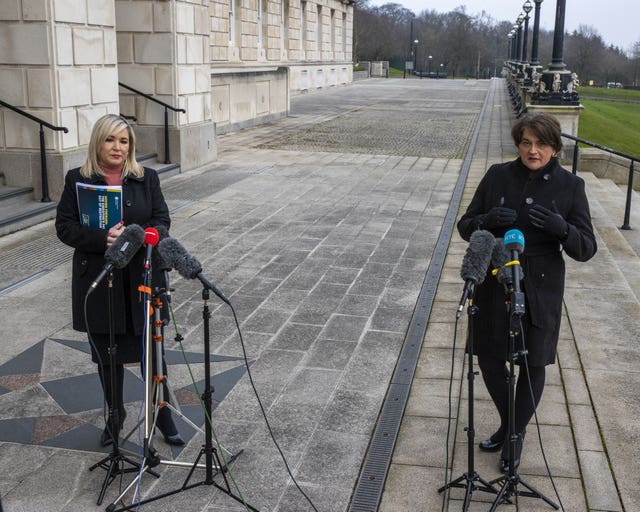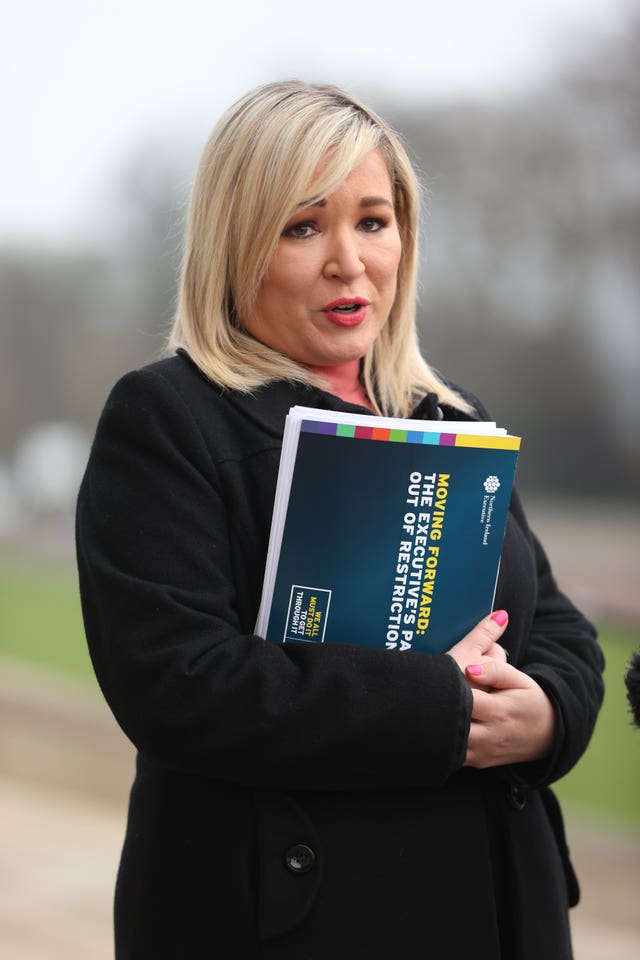Arlene Foster: This lockdown will be the last
The powersharing administration she helps lead has outlined its pathway to recovery but faced criticism for not attaching dates to it.

Stormont’s First Minister has vowed that Northern Ireland must never return to lockdown after a cautious plan to ease restrictions was published.
The powersharing administration Arlene Foster helps lead has outlined its pathway to recovery, but faced criticism for not attaching dates to it.
The country has been in deep freeze since Christmas.
“That is what I am focused on because we certainly cannot go back into a lock down again.”
Ministers’ blueprint to reopen society focused on nine areas like retail, hospitality and education.
Each will emerge from cold storage in stages.
The document does not include any target dates and ministers have promised decisions on moving between stages will be based on scientific and medical evidence, not the calendar.
During the pandemic, ministers from a newly-formed five-party coalition have co-operated, but there has been political disagreement between the DUP and Sinn Fein over education and potential breaches of the rules on social gatherings at republican funerals.
Mrs Foster said the Pathway to Recovery plan, agreed by all ministers, was a direction of travel and would help encourage optimism.

“Certainly there is a lot of frustration out there.”
Stormont Executive ministers signed off on the strategy earlier on Tuesday.
It focuses on nine key areas – retail, hospitality, education and young people, work, culture, heritage and entertainment, sports and leisure, travel and tourism, worship and ceremonies, home and community.
The stages of restriction begin with lockdown then extend to cautious first steps, gradual easing, further easing, and preparing for the future.
Delivering the plan to the Stormont Assembly, the deputy First Minister said the region would turn a corner in the battle against Covid-19 in 2021.

She said the executive wanted to avoid a cycle of repeated lockdowns.
“We must do everything we can to try to make this one the last lockdown, with the underpinning insurance policy that this executive will take the steps needed to protect the health service,” she said.
“Taking all these factors together, we can take some tentative preparatory steps towards the lifting of restrictions. But great care is still needed.
“That is why the executive has agreed today a careful, cautious and hopeful approach to existing restrictions.”
Ms O’Neill said the plan built in time between phases of relaxations to provide space to examine evidence on the prevalence of the virus.
Critics like the fringe Traditional Unionist Voice (TUV) party leader Jim Allister have said the ministers’ pathway does not tell parents when they can return all children to school permanently or allow them to attend sports clubs.
Under the executive’s plan, P1 to P3 primary school children will return to school on March 8.
Mrs Foster said ministers would review education on March 16.
She added: “I hope, given all of the data that is there, that that will mean that everyone can return after Easter.”
Mr Allister said: “We have been given a cliche-ridden algorithm for dither.
“It is not much of a satnav if it does not tell you the route or when you expect to get there.”
Two more people have died with Covid-19, the Department of Health said on Tuesday.
A further 149 new cases of the virus have also been confirmed.
As of Tuesday morning, a total of 289 hospital beds were occupied by Covid-19 patients, 34 of whom were in intensive care.





